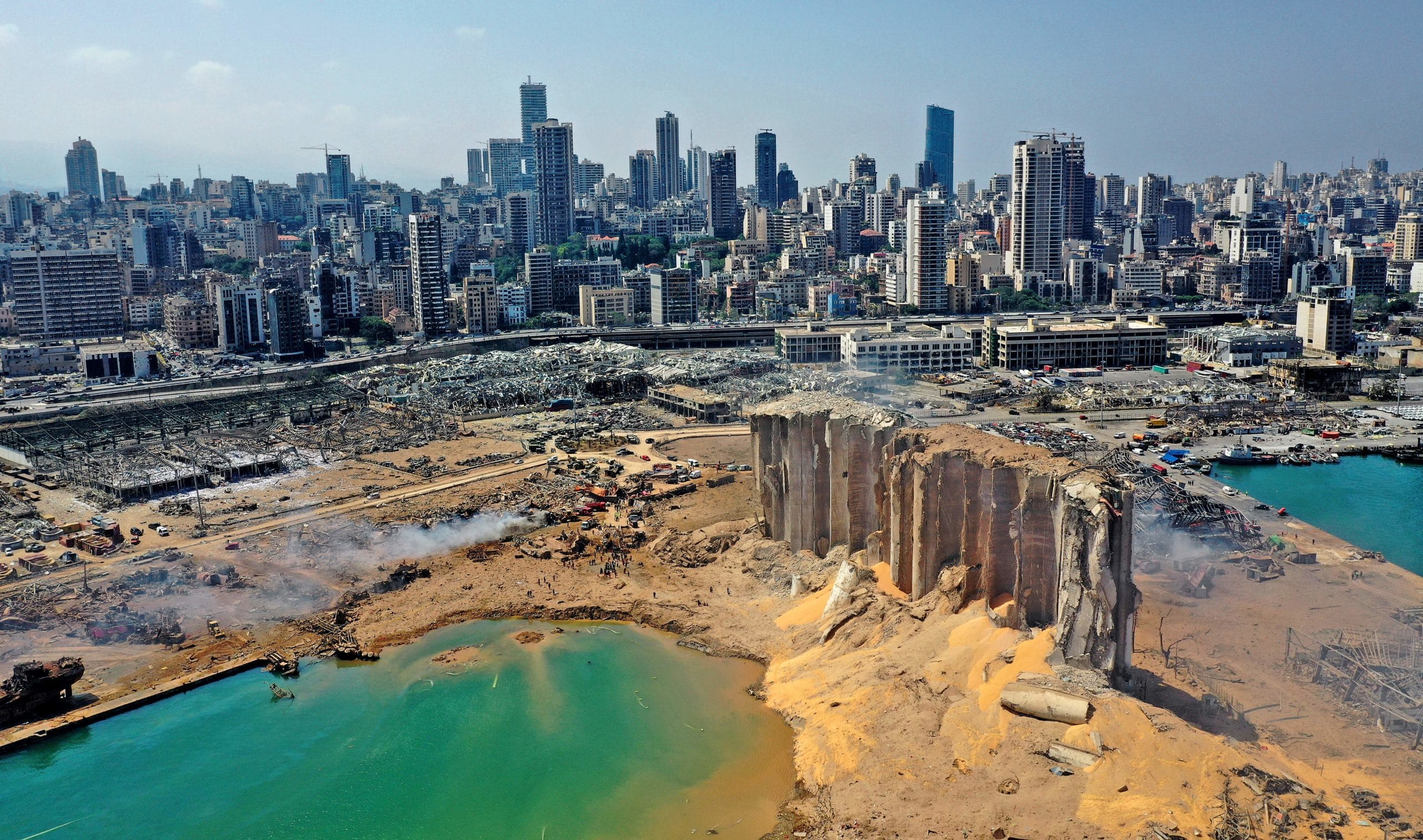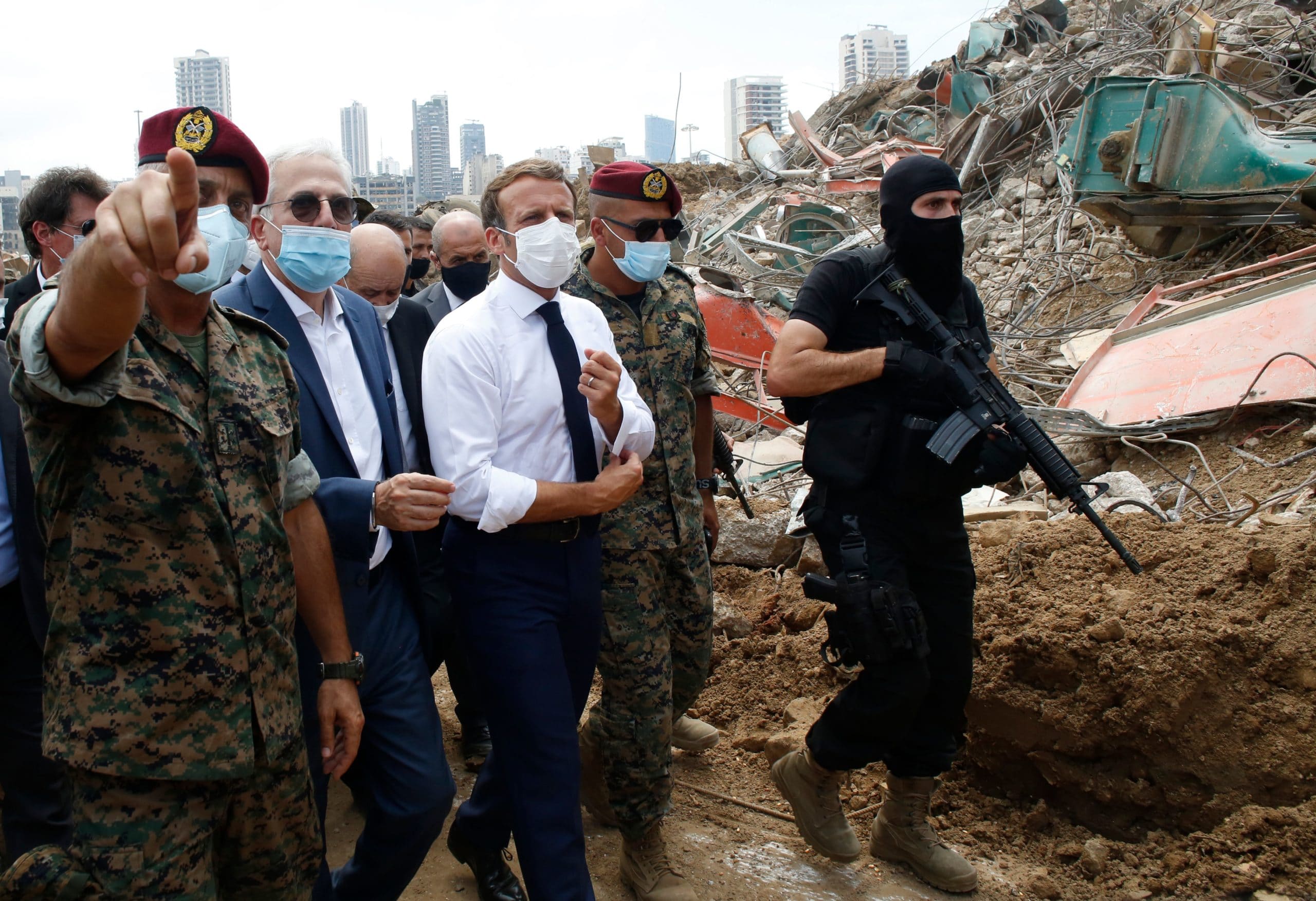January 14, 2021 | From Trump to Biden Monograph
Lebanon
January 14, 2021 | From Trump to Biden Monograph
Lebanon
Current Policy
The Trump administration sought to escalate pressure on Hezbollah while continuing its predecessors’ policy of attempting to strengthen Lebanese state institutions and insulate Lebanon’s financial system. Yet Washington could not forestall Lebanon’s banking sector meltdown and currency collapse or Hezbollah’s open domination of the state.
After parliamentary elections in May 2018, Hezbollah dictated Lebanon’s government-formation process over the following eight months. By allowing Saad Hariri to return as prime minister, Hezbollah provided a fig leaf to cover its dominant position. Hariri resigned nine months later amid mass demonstrations against the widespread corruption that brought the government to the edge of complete financial collapse. Hezbollah replaced him with Hassan Diab, a minor figure who resigned seven months later, paving the way for another Hariri nomination.1
With bipartisan support, the Trump administration pursued a campaign of sanctions designations targeting Hezbollah’s financial networks and money laundering operations. Beginning in 2019, the administration drew on the expanded powers granted by the bipartisan Hizballah International Financing Prevention Amendments Act.
In April 2019, the Treasury Department designated a Lebanese financier for laundering narcotics proceeds and facilitating money movements for Hezbollah.2 The following July, Treasury designated two Hezbollah members of parliament and the group’s security chief, Wafiq Safa.3
These sanctions set the stage for the August 2019 Treasury designation of Jammal Trust Bank – the only Lebanese bank to be sanctioned since the Lebanese-Canadian Bank in 2011.4 In early 2020, the Trump administration designated a network linked to Hezbollah’s Martyrs Foundation.5 Treasury later sanctioned two Hezbollah-allied former ministers as well as a Hezbollah Executive Council official and two companies subordinate to Hezbollah.6 In October 2020, Treasury designated two senior members of Hezbollah’s Central Council.7
In Europe, the Trump administration convinced key allies to eschew the false distinction between Hezbollah’s so-called “political” and “military” wings and instead treat the group in its entirety as a threat. In January 2020, the United Kingdom designated all of Hezbollah as a terrorist entity.8 In April, Germany banned all Hezbollah activities.9 The Trump administration also persuaded Kosovo and Serbia to blacklist Hezbollah as a whole.10 By the end of November 2020, Slovenia and Latvia also joined the list.11
Driven by popular anger against the entire political class, large-scale Lebanese protests that began in October 2019 challenged the U.S. policy of supporting the Lebanese state. In a failed attempt to quell the demonstrations, security personnel and the Lebanese Armed Forces (LAF) began beating and detaining protesters, dismantling their encampments, and forcibly opening blocked roads. Washington lamentably avoided criticism of the LAF’s behavior.12
The State Department even rushed to release frozen aid.13 Over four years, the administration provided around $2.2 billion in assistance, including some $680 million in military and security assistance.14

An aerial view shows massive damage at the Port of Beirut’s grain silos and the surrounding area on August 5, 2020, one day after a massive explosion hit the heart of the Lebanese capital. For years, successive Lebanese governments had ignored the massive stockpile of ammonium nitrate at the port. (Photo by AFP via Getty Images)
The administration insisted that any international bailout for Lebanon would depend on structural reforms, both political and financial. Yet after a massive explosion at the Beirut Port in August 2020, the administration seemed to welcome a French initiative, coordinated with Hezbollah, that required only limited reforms in return for French-backed financial assistance. Shockingly, a top State Department official said the administration would not oppose Hezbollah’s participation in government so long as that government undertook reforms.15
Washington also acceded to Paris’ request for the UN Security Council to renew, without effective changes, the mandate of the United Nations Interim Force in Lebanon (UNIFIL). Finally, the State Department sought to bolster the Beirut government by facilitating an Israeli-Lebanese framework agreement for negotiating the demarcation of the two countries’ maritime border.16 By late November, the talks stalled and were postponed, as the Lebanese government only hardened its maximalist position.17
Assessment
While the Trump administration made some progress in Lebanon, it operated under the mistaken belief that there is a difference between Lebanese state institutions and Hezbollah. It failed to realize that any effort to strengthen the Lebanese state ultimately strengthens Hezbollah while undercutting American efforts to exert pressure on the group.
The Trump administration continued to pour money into the LAF even though the army did nothing to address Hezbollah’s military build-up. In September, the Israeli government released intelligence showing that Hezbollah had built three facilities in Beirut and the neighboring area to its south for the assembly of precision-guided missiles.
To its credit, the Trump administration implemented a robust sanctions policy against Hezbollah. By contrast, Washington was slow to sanction corrupt political leaders, whether openly or tacitly partnered with Hezbollah. After the country’s financial collapse, a full year passed before Treasury employed Global Magnitsky authorities to designate former minister Gebran Bassil for corruption.18 Bassil, the Hezbollah-allied son-in-law of the Lebanese president and a leading contender to succeed him, was the only prominent political figure targeted.
While Treasury’s designation of Jammal Trust Bank was a milestone, Hezbollah’s penetration of the financial system runs much deeper than the U.S. government has been willing to publicize. According to a civil complaint filed in New York federal district court, 11 additional commercial banks in Lebanon “knowingly provid[ed] extensive and sustained material support, including financial services to Hezbollah and its companies, social welfare organizations, operatives, and facilitators.”19

French President Emmanuel Macron, surrounded by Lebanese servicemen, surveys the damage at the Port of Beirut on August 6, 2020. (Photo by Thibault Camus/POOL/AFP via Getty Images)
The State Department also supported courses of action that benefited Hezbollah, such as the French initiative to form a new government, which was coordinated directly with Hezbollah.20 Letting Paris lead the way was doubly self-defeating given that France remains the main impediment to an EU-wide designation of Hezbollah. That said, the administration deserves ample credit for decisions by the United Kingdom, Germany, and others to blacklist Hezbollah in toto.
Another example of strategic incoherence is the State Department’s ill-timed and unnecessary pursuit of maritime border demarcation talks between Lebanon and Israel.21 The talks offer the Hezbollah-dominated system in Lebanon the prospect of future revenue from offshore gas in return for nothing – other than allowing a consortium led by Total, the French oil major, to begin operations and investment in Lebanese waters.
The pursuit of maritime talks potentially opens the door to relitigating the matter of Shebaa Farms, a small strip of land in the Golan Heights claimed by Lebanon, over which the Trump administration recognized Israeli sovereignty.
Similarly, the State Department offered the French and the Lebanese another gift when it assented last August to the renewal, without changes, of the UNIFIL mandate. UNIFIL has been an unmitigated failure at keeping its area of operations south of the Litani River free of armed personnel, assets, and weapons and at preventing Hezbollah from employing the area as a launchpad for aggression. Since the United States has been unable to reform UNIFIL, the administration should not have renewed its mandate.
Finally, the U.S. Congress deserves credit for passing the Sanctioning the Use of Civilians as Defenseless Shields Act of 2018 (“Shields Act”), which authorizes the president to impose sanctions on Hezbollah, Hamas, and associated entities responsible for the use of human shields to protect their military assets. For example, the three clandestine missile factories exposed by Israeli intelligence are all located beneath residential apartment buildings. However, in the two years since the passage of the Shields Act, the administration did not issue any designations, despite laudable efforts to employ other kinds of sanctions to exert pressure on Hezbollah.
Recommendations
Hezbollah is more than a client or proxy of the Islamic Republic of Iran; it is an extension of the regime. Since the group’s founding at the hands of Iran’s Islamic revolutionary cadres in Lebanon, Hezbollah has served as Tehran’s long arm and as the prime export of the regime’s ideology and revolutionary model. That premise should inform all aspects of U.S. policy. Furthermore, with the group now holding the commanding heights of the country and firmly ensconced in the government apparatus, the United States should jettison the artificial distinction between the Lebanese state and Hezbollah.
- Do not deal with, let alone fund, a government that includes or is directly influenced by Hezbollah. Supporting the Lebanese government inevitably makes the United States complicit, as Hezbollah shapes and determines the policy of Lebanon’s government and has access to its budget.
- Escalate pressure on Hezbollah. Washington should pursue this policy regardless of Lebanon’s financial crisis or any regional diplomatic initiative.
- Craft U.S. sanctions, whether Hezbollah-related or targeting other members of the political class under the Global Magnitsky Human Rights Accountability Act, to reflect the fact that Hezbollah and the Lebanese state are indistinguishable. Washington should not employ sanctions as a tool to micromanage Lebanese politics in the service of some version of state building. Rather, sanctions should aim to squeeze Hezbollah’s financial networks and the corrupt oligarchic system that facilitates and partners with Hezbollah.
- Continue to pressure the European Union to designate all of Hezbollah as a terrorist organization, but also recognize that increased French investment in Lebanon will likely harden Paris’ opposition to such a designation. Hezbollah itself rejects the EU distinction between its so-called military and political wings. No part of Hezbollah should have license to operate in Europe.
- Do not extend development and reconstruction aid to Lebanon, whether bilaterally or in the context of an international donor conference. So long as the existing sectarian political order, dominated by Hezbollah, remains in place, such aid only subsidizes Hezbollah and its corrupt partners.
- Suspend all aid to the LAF. The armed forces continue to collaborate with Hezbollah and have failed to take any action to restrain it, even against exposed Hezbollah missile facilities or arms depots in civilian areas.
- Move swiftly to employ sanctions pursuant to the bipartisan Shields Act. The use of human shields is a war crime. The United States should target Hezbollah officials and associated entities as well as any Lebanese political and security officials implicated in placing Hezbollah military assets in civilian areas.
- Insofar as reforming the UNIFIL mandate is not on the table, veto its renewal at the UN Security Council when the mandate expires in August 2021. Absent a major overhaul, UNIFIL is incapable of serving as anything more than a fig leaf for Hezbollah control of UNIFIL’s area of operations.
- Do not allow Israeli-Lebanese maritime border demarcation talks to drag on through 2021. As Lebanon has now hardened its maximalist position, the United States should pull the plug on the ill-conceived process. In addition, Washington should reassert publicly its position that the Shebaa Farms are not Lebanese, but part of the Golan Heights, which should remain firmly under Israeli sovereignty.
